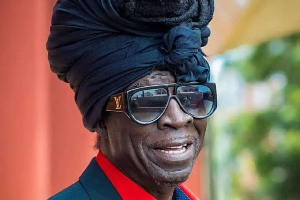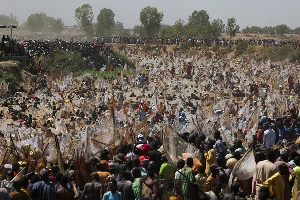Accra, March 18, GNA - Mr. Owusu Amoakohene, Research Adviser to the Ministry of Tourism and Diaspora Relations, on Tuesday said domestic tourism in Ghana generated more income in the communities than international tourism.
He said data collected from 33 tourists attraction sites in 2007 showed that 413,440 Ghanaian tourists visited various tourists sites within the country generating about GHc 428,489. Data from international tourists arrivals for 2007 could not be collected because the Ghana Immigration Service changed the embarkation cards filled at the airport on arrival, Mr Amoakohene said. He was speaking on the theme: "Tourism and Community Development" at a day's seminar organized by the sector ministry for managers of Tourists' Receptive Facilities in the country.
He mentioned the Kakum National Park, Cape Coast and Elmina castles, Manhyia Palace and the Aburi Botanical Gardens as five topmost visited places during the year under review.
According to the United Nations World Tourism Organization, a tourist is any person outside his or her normal place of residence for a period not exceeding 12 months and whose main purpose of visit is other than engaging in an exercise that would earn him/her income from within the community.
Mr Amoakohene noted that the tourism industry was government-led, private sector driven and community-based and said there was the need for all the three sectors to work together to ensure the success of the industry.
He said the Ministry was trying to create an enabling environment that would facilitate 20 per cent growth in the tourism sector, adding that, the industry currently employed 220,000 people out of which 45 percent were women.
Mr Amoakohene advised managers of the facilities to put in place mechanisms that would encourage tourists who visited sites in their communities to stay longer so that the communities could make more money.
Mr Stephen Asamoah-Boateng, Minister of Tourism and Diaspora Relations, said the ministry wanted people on the ground to share with them any challenges faced in the course of their duty. Pledging the Ministry's support he said: "We will do our part to create an enabling environment to enable private sector tourism practitioners to explore the full potentials in the tourism industry especially in the communities."
Mrs. Bridget Katsriku, Chief Director of the Ministry of Tourism and Diaspora Relations, said tourism had the potential to transform the economies of various communities and to help in poverty alleviation. She urged participants to share their ideas and experiences and not hesitate to make any suggestions to the Ministry. Participants expressed concerns about the condition of most beaches in the country and urged the Ministry to put in place policies that would ensure that beaches were clean and attractive.
Business News of Tuesday, 18 March 2008
Source: GNA












